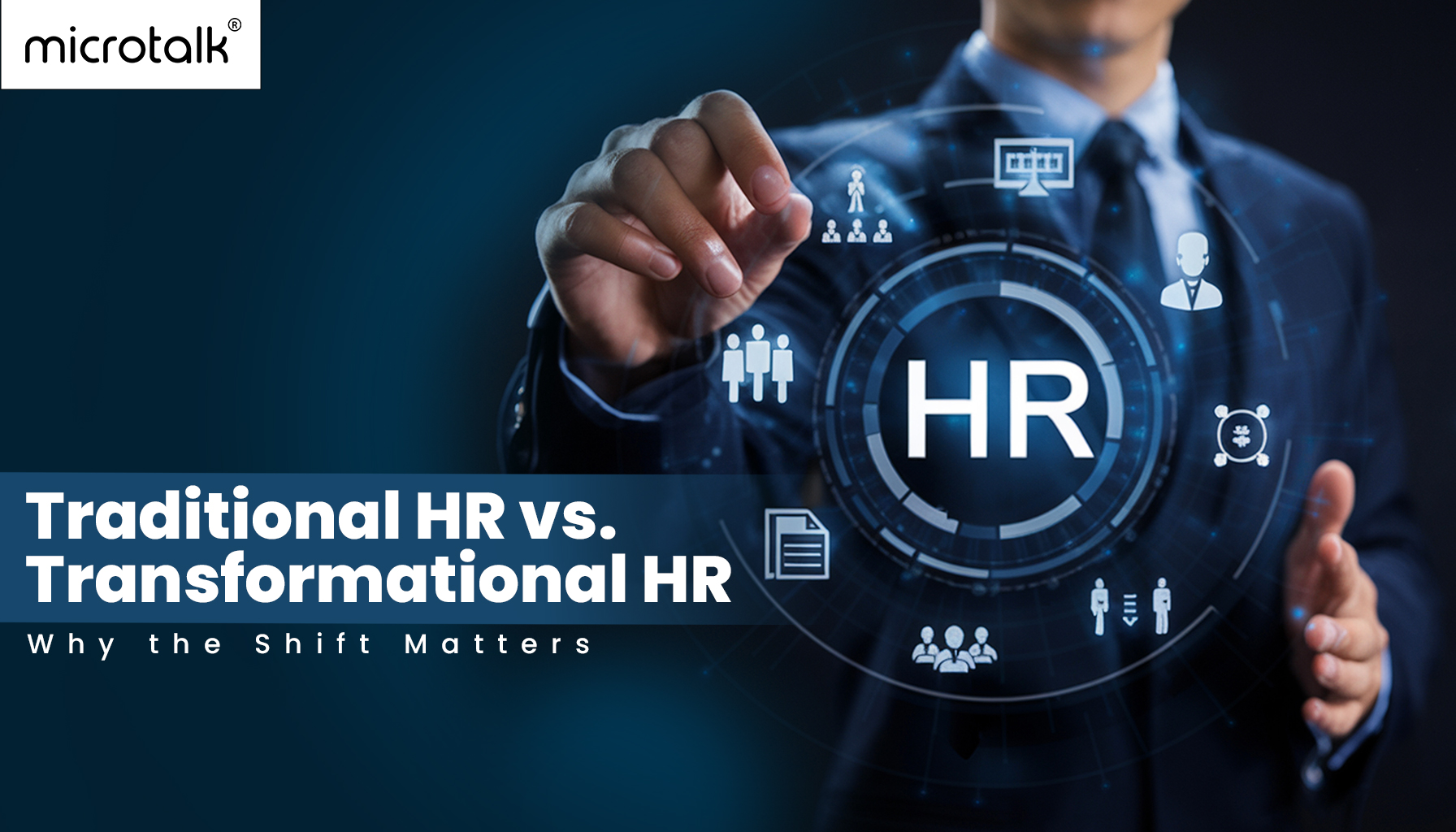Traditional HR vs. Transformational HR: Why the Shift Matters
HR’s Evolution: From Rulebooks to Revolution
The HR Wake-Up Call: Why “Business as Usual” is Broken
Picture this: A team of talented employees, buzzing with ideas, collides with a wall of forms, rigid policies, and a department known for saying “no.” Frustration builds. Creativity stalls. Growth flatlines.
This was HR’s legacy for decades—a necessary evil, not a growth engine. But the game has changed. In today’s workplace, where talent is the ultimate competitive edge, HR isn’t just changing—it’s undergoing a revolution.
At Microtalk, we believe HR’s new mission is clear: Ditch the bureaucracy. Ignite human potential.
The Old HR Playbook: Why It’s Failing
Let’s be honest—traditional HR often felt like a traffic cop, not a coach. Here’s why the old model is crumbling:
“Compliance First, People Second” Mentality
Rules trumped relationships. HR teams spent more time policing attendance policies than understanding what motivated employees. Result? Disengaged teams and missed opportunities.
Top-Down “Because We Said So” Culture
Decisions were made in closed rooms, with little input from the people affected. Employees felt like cogs, not collaborators.
Fear of Change
Sticking to outdated processes became a safety net. Innovation? Too risky. Agility? Not in the job description.
The Department of “No”
Need flexibility? “Against policy.” Want to experiment? “Let’s form a committee.” HR became synonymous with slowdowns, not solutions.
The cost? Talent turnover, stagnant innovation, and workplaces where people showed up but checked out.
The New HR Era: Where People Power Business
Modern HR isn’t a department—it’s a culture architect, a strategic partner, and a talent accelerator. Here’s how transformational HR rewrites the rules:
1. From Policy Police to Purpose Partner
Transformational HR aligns every policy, program, and conversation with two questions: Does this help people thrive? Does this drive business forward?
Example: Instead of rigid 9-to-5 rules, HR crafts hybrid work guidelines that balance productivity and well-being.
2. Employees as Co-Creators, Not Compliance Cases
The new HR listens first. Regular pulse surveys, open forums, and feedback loops turn employee voices into action.
Real impact: A tech company used employee input to redesign its career paths, cutting turnover by 30% in a year.
3. Agility Over Bureaucracy
Transformational HR ditches the “we’ve always done it this way” script. It experiments, iterates, and adapts.
Think: Rapid upskilling programs to meet market shifts, or dynamic performance models that reward collaboration, not just individual metrics.
4. Leading Through Change (Not Just Managing It)
From AI disruption to hybrid work, HR now guides teams through uncertainty. It’s less about control, more about empowerment.
Case in point: Companies with agile HR report 5x faster adaptation to industry disruptions.
5. Heart + Data
Modern HR balances empathy with insights. It uses analytics to spot burnout risks, predict retention trends, and tailor leadership coaching—all while fostering human connection.
Why This Shift Isn’t Optional
The data doesn’t lie:
Companies with transformational HR see higher revenue growth.
Teams led by people-centric HR report lower absenteeism.
Employees say culture matters more than salary.
But beyond numbers, this is about survival. In a world where talent can work anywhere, workplaces that prioritize humanity, flexibility, and growth will win.
The Future of Work Starts with HR
Imagine a workplace where:
HR isn’t a barrier, but a bridge to innovation.
Employees don’t just comply—they commit.
Change isn’t feared—it’s fuel.
This isn’t a utopia. It’s what happens when HR swaps rulebooks for radical empathy, and paperwork for purpose.
Ready to reimagine HR?
Start here:
Audit Your Culture: Are your HR practices building trust or bureaucracy?
Empower Managers: Equip leaders to coach, not control.
Measure What Matters: Track engagement, agility, and innovation—not just compliance.
HR’s revolution isn’t coming—it’s here. And the companies that embrace it won’t just survive. They’ll redefine what it means to work.
Let’s build workplaces where people don’t just work—they thrive.
